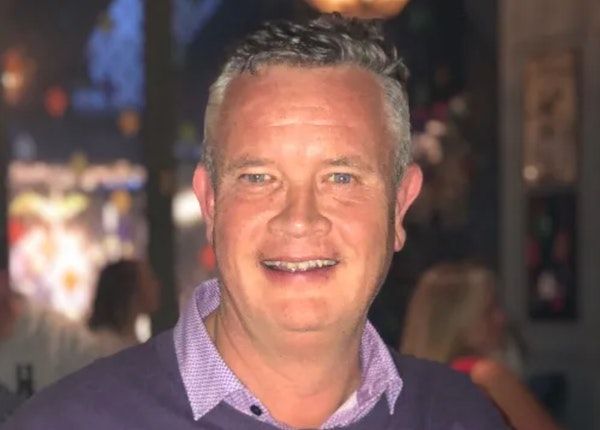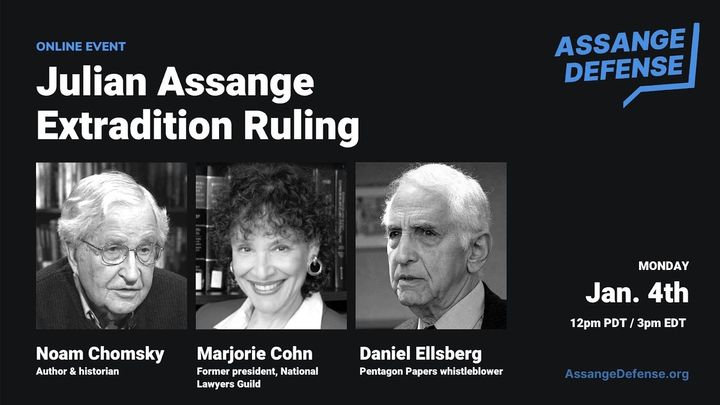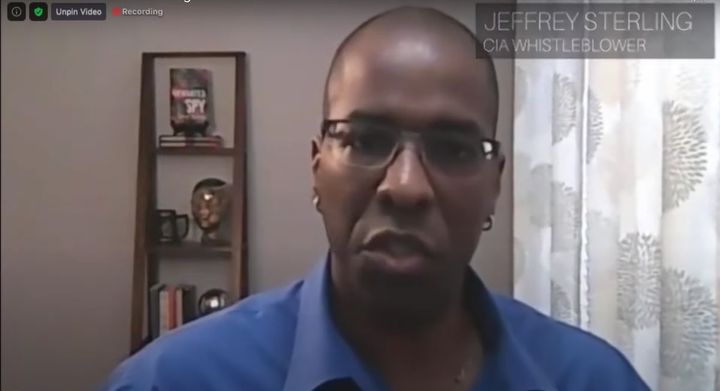In Closing Argument For Assange’s Extradition, Prosecutors Cast WikiLeaks As Criminal Enterprise
Crown Prosecution Service lawyers representing the US government contend WikiLeaks was in the “business of encouraging individuals to hack into computers.”


A United States counterintelligence strategy document signed by President Donald Trump warned the “number of actors targeting the United States is growing.”
Lumped in with Russia, China, Iran, North Korea, Cuba, and terrorist groups were “ideologically motivated entities, such as hacktivists, leaktivists, and public disclosure organizations” that U.S. intelligence agents view as “significant threats.” [PDF]
In the closing argument for the extradition case against WikiLeaks founder Julian Assange, Crown Prosecution Service lawyers cast WikiLeaks as an ideologically motivated entity that was in the “business of encouraging individuals to hack into computers.”
Prosecutors further allege Assange encouraged the “mass and indiscriminate theft of a vast number of documents,” and they sidestep issues of freedom of expression by maintaining WikiLeaks “cannot be compared to the New York Times.”
“WikiLeaks’ very purpose and design was to recruit persons to break the law—by circumventing classification restrictions and computer and access restrictions,” the submission states. They solicited classified information through a “Most Wanted Leaks” list and invited insiders to break the law or outsiders to hack into government agencies.
Referring to a third indictment that was announced in June and served on the defense weeks before the extradition trial, prosecutors claim Assange told an audience of hackers there was a “small vulnerability within the Congress document distribution system.” He publicized materials he wanted “obtained by hacking” and “exhorted” the public to “join the CIA in order to steal information.”
It mentions a 17-year-old who Assange allegedly asked to “commit computer intrusions and steal audio recordings of conversations between high ranking officials of a NATO country.” He also allegedly instructed this minor to “break into someone’s computer and delete chat logs.”
This minor referred to as the “Teenager” is Sigurdur “Siggi” Thordarson was, according to the defense, “convicted in Iceland of fraud, theft, and impersonation of Julian Assange.” He forged a letter and switched an account so he could embezzle $50,000 worth of funds from the WikiLeaks.
The Iceland Monitor reported in 2015 that Thordarson was sentenced to three years in prison for “sexual violations against nine boys.” He “abused one boy over forty times over the period of two years when the boy was aged 15-17.” Each boy was promised “payment in exchange for oral and anal sex,” and he also offered to “pay for things such as internet connections, telephone bills and television subscription and even to open up overseas bank accounts.”
Thordarson was an FBI informant, who begged agents for money. They eventually paid him $5,000 for the “work he missed while meeting with agents” in Alexandria, Virginia, where the grand jury investigation into WikiLeaks was empaneled.
The defense recalled, “The Icelandic Interior Minister of the time is reported to have ordered a number of FBI prosecutors, who had arrived in Iceland to investigate the ‘Teenager’s’ claims, to leave Iceland. The Interior Minister made statements at the time and has made statements since that he believed the investigation was in order to ‘frame Assange.'”
At the Hacking at Random conference in the Netherlands in 2009, Assange allegedly said WikiLeaks identified “a small vulnerability” inside the document distribution system of the United States Congress” that could be used to download “reports of the Congressional Research Service that were not available to the public.”
Until 2016, unclassified CRS reports were needlessly kept secret by Congress. WikiLeaks posted nearly 7,000 of the reports in 2009 to subvert a “gray market” around the documents, where opportunists smuggled out reports and offered them to lobbyists, law firms, multinational corporations, and foreign governments.
The inspector general of the Library of Congress investigated the publication of CRS reports but was apparently unable to connect the leak—or exploitation of a security vulnerability—to WikiLeaks.
Following NSA whistleblower Edward Snowden’s revelations on U.S. mass surveillance programs, Assange addressed the Chaos Computer Club conference in Germany in December 2013. He encouraged young systems administrators to “join the CIA.”
“Go in there,” Assange said. “Go into the ballpark and get the ball and bring it out—with the understanding, with the paranoia, that all those organizations will be infiltrated by this generation, by an ideology that is spread across the Internet. And every young person is educated on the Internet.”
To the Justice Department, Assange’s comment “exhorted” the next generation of people to become CIA employees to “steal” classified information and hack into government computer systems. However, Assange did not specifically ask anyone to engage in any conspiracy. He appealed to young people to address a crisis of corruption in government by forcing transparency at a time when governments universally use secrecy regimes to conceal crimes, unlawful programs, and other abusive acts.
The “Most Wanted Leaks” list is a central part of the government’s conspiracy theory against Assange. But Pfc. Chelsea Manning, the U.S. Army whistleblower who was the source of materials at issue in this case, never provided any of the “bulk databases” that were included in the list.
As David Coombs, who was Manning’s defense attorney, stated during her court-martial, military prosecutors were only able to “remotely” tie her to “four of the things on the list.”
On June 8, 2013, at her trial, her defense heavily disputed whether Manning had ever seen a draft of the “Most Wanted Leaks” list. Manning did not mention the list at all in her statement to the court when she pled guilty to some offenses.
Rainey Reitman and Kurt Opsahl of the Electronic Frontier Foundation (EFF) highlighted this aspect of the case. “Unlike much of Wikileaks.org, the ‘Most Wanted’ Leaks was actually a publicly-editable wiki.”
“Rather than viewing this document as a wishlist generated by Wikileaks staff or a reflection of Assange’s personal priorities, we must understand that this was a publicly-generated list developed by contributors who felt each ‘wanted’ document offered information that would be valuable to the public,” Reitman and Opsahl contended.
Or put another way: Coombs described the list as “WikiLeaks saying, look, tell us, humanitarians, activists, NGOs, fellow reporters, what do you want to know in your country? What in your country is being hidden from the public that you believe the public should know? Give us a list.”
“We are going to compile that list, and we are going to work to obtain that list. What does this sound like? Any journalistic organization that has like a hotline or anything else says, call us. You got a story. Call us. We’ll investigate.”
The U.S. government is dependent on the “Most Wanted Leaks” list to create the impression that Manning was “working for WikiLeaks.” If Manning was not recruited, it becomes harder to argue that Assange aided, abetted, or conspired to steal classified documents.
Prosecutors tried to address this dilemma by subpoenaing Manning to testify before a grand jury and jailing her for a year. Manning held to her principles and resisted prosecutors, believing they intended to set a perjury trap that would force her into additional legal jeopardy.
The Crown Prosecution Service deals with this in their closing argument by relying on Assistant U.S. Attorney Gordon Kromberg and maintaining the U.S. prosecution is not “bound to accept the account given by Ms. Manning in her own defense or mitigation.”
After Ms Manning’s guilty pleas, a “providence inquiry” was initiated to ensure that the plea was voluntary and grounded in fact. This was a limited enquiry into the facts which Ms Manning had chosen to admit, and she was not subjected to exhaustive questioning about the offences or surrounding circumstances [Kromberg 1, CB2 §§142-3, Kromberg 4, CB8 §42]. Thereafter Ms. Manning refused to testify before a grand jury and has been found to be in contempt [§§145-156]. The second affidavit of Gordon Kromberg [CB3 §§12 and 13] maintains the factual position of the prosecution. Ms. Manning is alleged to have responded to requests made in the “Most Wanted” list.
It is unclear what “allegations” Kromberg or the Justice Department are referring to in their case. None, in particular, were relied upon by military prosecutors.
Unfortunately, District Judge Vanessa Baraitser is likely to find this is a dispute between prosecutors and defense attorneys that could be settled at trial.
The defense submitted their closing argument on November 6, and they had an opportunity to submit a rebuttal to the prosecution after November 20.
Baraitser will rule on the extradition request on January 4.
Assange was charged in April 2019 with 17 counts of violating the Espionage Act and one count of conspiracy to commit a computer intrusion that contains elements of an Espionage Act offense. He is detained at the Belmarsh high-security prison in London, where he recently endured a COVID-19 outbreak.
Charges against Assange generally criminalize the act of receiving classified information, as well as the publication of state secrets from the U.S. government. It targets common practices in newsgathering, which is why the case is widely opposed by press freedom organizations throughout the world.




Comments ()